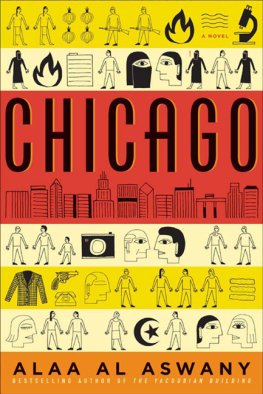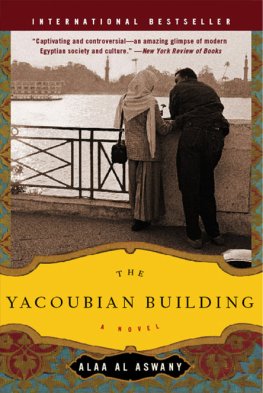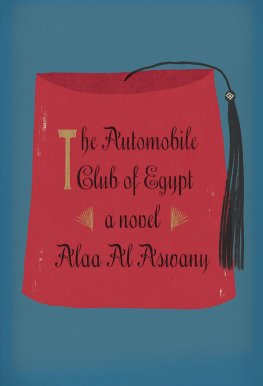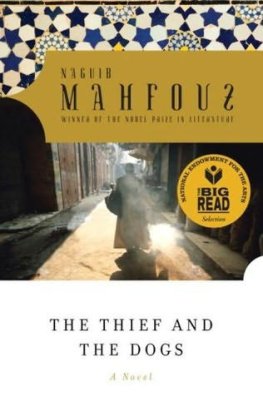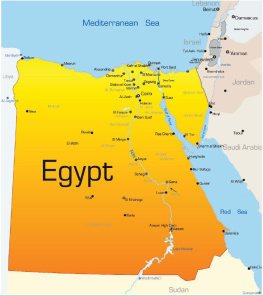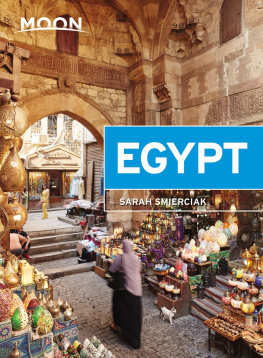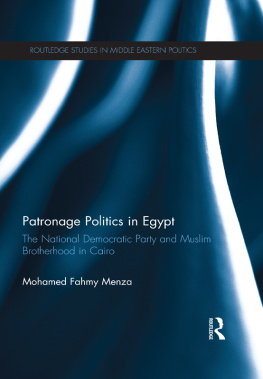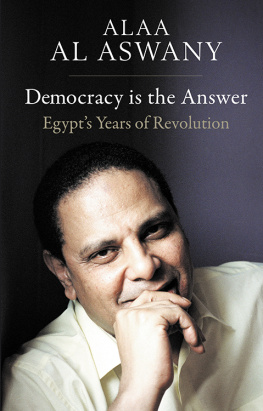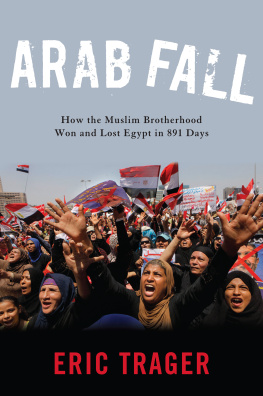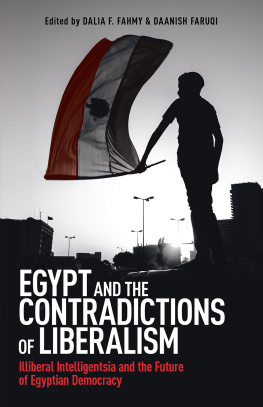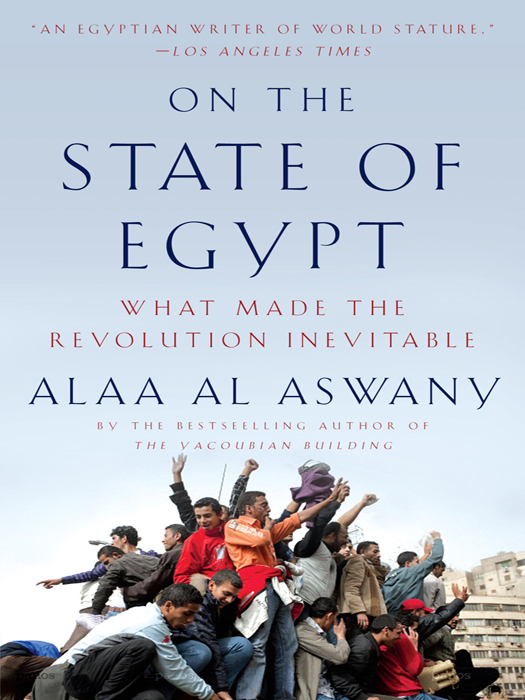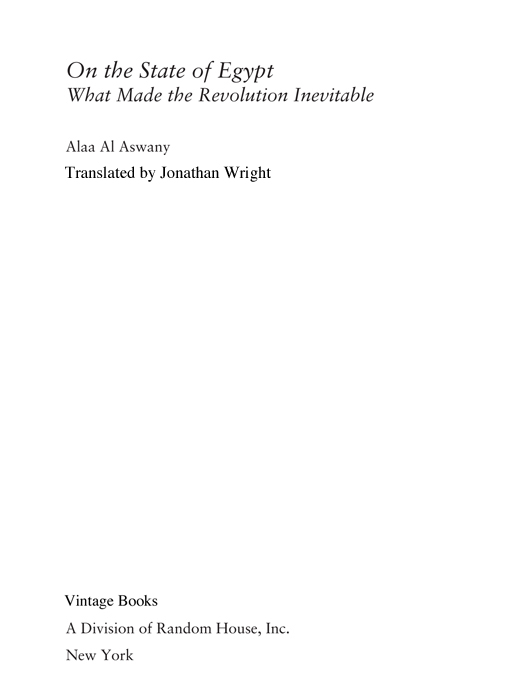Alaa Al Aswany
On the State of Egypt
Originally trained as a dentist, Alaa Al Aswany still has his own practice in Cairo. His first novel, The Yacoubian Building, which was longlisted for The International IMPAC Dublin Literary Award in 2006, has sold over a million copies worldwide, and was the bestselling novel in the Arab world for more than five years. Al Aswany is also the author of Chicago and a story collection, Friendly Fire. His work has been translated into twenty-nine languages, and published in over one hundred countries.
Also by Alaa Al Aswany
Friendly Fire
Chicago
The Yacoubian Building
FIRST VINTAGE BOOKS EDITION, JUNE 2011
Copyright 2011 Alaa Al Aswany
All rights reserved. Published in the United States by
Vintage Books, a division of Random House, Inc., New York and in Canada by Random House of Canada Limited, Toronto. Published simultaneously in hardcover in slightly different form by The American University in Cairo Press, Cairo.
All articles first appeared in Arabic in al-Dustur or al-Shorouk newspapers.
Vintage Books and colophon are registered trademarks of Random House, Inc.
eISBN: 978-0-307-94699-7
www.vintagebooks.com
v3.1
Contents
On Tahrir Square
An Introduction
Why dont Egyptians rebel? This question has been asked continually inside Egypt and abroad. All the conditions in Egypt made the country ripe for revolution: Hosni Mubarak had monopolized power for thirty years through rigged elections and was working to install his son Gamal as his successor. The level of corruption in government circles was unprecedented in the nations history. A small group of businessmen, mostly friends of Gamal Mubarak, had complete control over the economy and were running it in pursuit of personal interests. Forty million Egyptians, half the population, were living below the poverty line, on less than two dollars a day. Egypt was in decline by every measure: from public health and education to the economy and foreign policy. A few rich people lived like kings in their palaces and resorts, moving around in private planes, while the poor unable to support their families were committing suicide or sometimes dying in the crush to obtain cheap bread or bottles of propane. The vast police apparatus that cost the people billions was one of the fiercest instruments of repression in the world. Every day, Egyptians were tortured in police stations and in many cases the wives and daughters of the accused were violated before their eyes as a means to force confessions to crimes that they had not committed.
Why didnt Egyptians rise up against all these injustices? There were three explanations for why there had been no revolution. The first was that long repression had bequeathed such a legacy of cowardice and submission that Egyptians would not rise up, whatever happened. The second was that revolution in Egypt was possible but numerous factors were standing in the way, such as the lack of an organized resistance to lead the masses and the fact that Egyptians were preoccupied trying to make a living and were seeking individual solutions to their problems. As oppression and poverty grew more severe, many preferred to escape, geographically and historically. Geographically, they moved to the oil states in the Gulf, taking humiliating jobs just to come home with enough to live on; others chose to travel in time, hanging on to the past and living in their imaginations in what they thought was the golden age of Islam. They wore gallabiyas, grew long beards, and adopted the names of early Muslims in order to escape from the cruel reality of the present to the glories of the past. Saudi oil money, with the blessing of the Egyptian regime, produced an aggressive campaign to promote the Wahabi interpretation of Islam, which orders Muslims to obey their ruler however iniquitous and corrupt he might be. The third explanation, which I favored, asserted that Egyptians were no less inclined toward revolution than other peoples, and that in fact they had carried out more revolutions in the twentieth century than some European nations, but that by their particular nature Egyptians are less inclined toward violence and more inclined toward compromise. The Egyptians are an ancient people with a history stretching back seven thousand years and so, like old men, they have the wisdom to avoid problems insofar as they can while continuing to live and bring up their children. Only when they are certain that compromise is no longer possible they turn to revolution. Egyptians are like camels: they can put up with beatings, humiliation, and starvation for a long time but when they rebel they do so suddenly and with a force that is impossible to control.
I was sure that revolution was coming soon. Many of my Egyptian and foreign friends disagreed, accusing me of false optimism and unrealistic romanticism. I did not lose my confidence in the people for a single moment, even though none of the evidence justified my confidence. The protest movements in Egypt were small and ineffective, and, being so feeble, succeeded only in tempting the regime officials to take more for themselves at the expense of the peoples suffering. The regime was emboldened to believe it could do whatever it liked and used the vast apparatus of repression to crush its opponents. I remember meeting the former finance minister over dinner at a friends house at a time when he had just pushed through tax legislation that would add to the burdens of the poor. When someone asked him, Arent you worried the people might revolt? the minister laughed and answered, Dont worry. This is Egypt, not Britain. Weve taught Egyptians to accept anything. This arrogant and contemptuous attitude was prevalent in the regimes discourse, from Hosni Mubarak down to the humblest civil servant.
In such an atmosphere when I read on the Internet about the call to demonstrate in Tahrir Square on 25 January, I did not pay much attention. I said to myself, Itll be another small demonstration with two or three hundred people, surrounded by tens of thousands of riot police to stop them marching. On the morning of 25 January I woke up early as usual and busied myself working on my new novel until midday, but when I sat down for lunch and turned on the television I saw the miracle. Tens of thousands of Egyptians had come out into the streets calling for the downfall of the regime and Mubaraks departure. I dressed hurriedly and joined the Egyptian revolution until the end. I lived eighteen days in the street except for a few hours when I slept and checked in with my family. The people I saw in Tahrir Square were new Egyptians and had nothing in common with the Egyptians I was used to dealing with every day. It was as if the revolution had re-created the people in a higher form. It is unfair to call this a youth revolution. Young people began and led it, but the whole Egyptian people joined in. In Tahrir Square I saw the nation fully represented: Egyptians of all ages and backgrounds, Copts and Muslims, young and old, children, women in hijab and women without, rich and poor. Millions of people took a stand in Tahrir Square, living together like members of one family. There was a deep feeling of solidarity and mutual courtesy, as if the revolution had not only rid Egyptians of fear but also cured them of their social defects. It was an extraordinary phenomenon to have thousands of women sleeping in the street without anyone harassing them. People left their personal belongings in the street certain that no one would steal them. Coptic Christians formed a ring around Muslims as they prayed to protect them from attacks by the regimes forces. Muslim prayers and a Coptic liturgy took place at the same time for the souls of those killed in the revolution, and a young man with a guitar sang an anti-Mubarak song into the microphone. Thousands of people danced for joy and the devout with their beards could not help but sway to the rhythm. It was an atmosphere of complete tolerance in which the protesters accepted and respected one anothers differences. We may have had different ideas and ideologies, but the most important thing was our common objective: bringing the dictator down and winning freedom for Egypt. My experience of the revolution could fill a whole book. Every night I spoke in front of a million people, and I will never forget their eyes, full of anger and determination, and their united chant roaring like thunder: Down with Hosni Mubarak!


